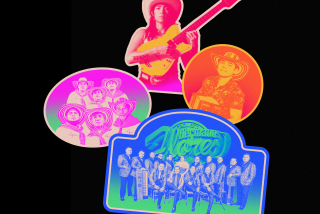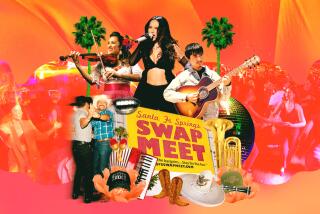Divided They Stand : Despite Differences of Opinion Over Cajun and Zydeco Definitions, Bands Work as One to Move the Crowd
- Share via
LONG BEACH — There’s a lot to debate today in Cajun and zydeco music, and just about all of those things were showcased at Saturday’s opening day of the weekend’s 11th annual Long Beach Cajun & Zydeco Festival.
Purism vs. progress? There was D.L. Menard’s acoustic, back-porch approach to Cajun traditions going up against Steve Riley & the Mamou Playboys’ use of those roots as a launching pad for forays into rock ‘n’ roll, jump-boogie blues and western swing.
The urbanization of zydeco? Frankly, if you removed the accordion and rub board from Nathan & the Zydeco Cha-Chas mix--along with leader Nathan Williams’ umpteen uses of the word “zydeco” in lyrics and shouts--you’d be left with a ‘90s descendant of the New Orleans rock ‘n’ R&B; of Fats Domino, et al. That’s about as true to zydeco’s roots as Marilyn Manson is to Robert Johnson.
But who cares about any of that when you’re dancing your feet off on a gorgeous day? And from the first notes of the Bay Area-based openers Motordude Zydeco Band to the last note from Williams and crew, feet had plenty to do.
*
Menard, following the exuberant, funky Motordude, had people moving with just the simplest of tools: age-old Cajun French two-steps and waltzes and the nasal, Hank Williams-influenced delivery that’s been his trademark since his “La Port d’en Arriere” (“The Back Door”) became a Louisiana standard in the early ‘60s.
Menard, though, is such an irrepressible character--punning with the audience in his nearly indecipherable accent--he could probably get people dancing just on his personality alone.
Saturday he also had ample assistance from fiddler Leo Abshire (a relative of the late, great Cajun accordionist Nathan Abshire) and young accordion player Horace Trahane, a particular prize. He’s just 20, but he sings as if he’s from the ‘20s, his rustic nasal sounding like it jumped right off of early Cajun recordings.
The young button-accordion wizard Riley, coming two acts later, offered a much wider range of styles but never lost sight of his origins, opening his set with traditional Cajun tunes to showcase his new album, “Friday at Last.” Soon thereafter, noting that he needed to stretch out the kinks from sitting on the plane from Louisiana, he cranked it up with such rockers as Chuck Berry’s “The Promised Land” and a jumping “Caledonia” and never looked back.
The key is that like Michael Doucet and Beausoleil, who pioneered this brand of Cajun-rock, Riley and his Mamou Playboys are simply a solid band, bringing character and dimension to whatever style they tackle. It may not be pure, but it sizzles.
It also segued nicely into Nathan & the Zydeco Cha-Chas’ driving set. While still reliant on many of the cliches that have infested zydeco, Nathan Williams brings more richness and depth to the style than many of his contemporaries.
Still, it’s party music, first and foremost, and it was party time Saturday. Riff after riff churned along, and Williams sang and chanted in a mellifluous tenor--sometimes even in French, which places him at least a little closer to zydeco roots than many others.
*
One of the day’s acts brought all the various Cajun and zydeco streams together. Ironically, it was not a Louisiana-based act, but Bay Area band Danny Poullard & the California Cajun Orchestra.
Poullard, a native of Eunice, La., who has lived in California since the early ‘50s, revels in the meeting points of the music he grew up with. His approach--just like the dance factor--renders any divisiveness and debate over what style is best completely irrelevant.
Sunday’s schedule included C.J. Chenier & the Red Hot Louisiana Band, Acadiana, Riley, Menard and Nathan & the ChaChas.
More to Read
The biggest entertainment stories
Get our big stories about Hollywood, film, television, music, arts, culture and more right in your inbox as soon as they publish.
You may occasionally receive promotional content from the Los Angeles Times.










